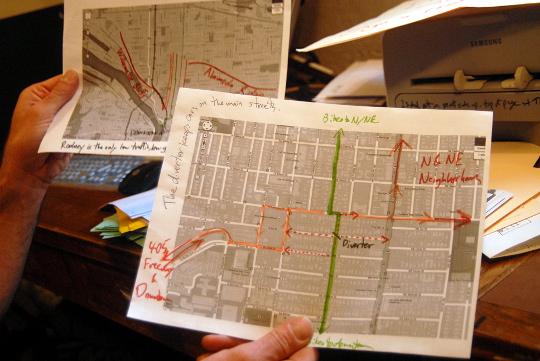
(Photos: M.Andersen/BikePortland)
Portland’s newest bike advocacy organization is bringing back the postcard.
In the last few weeks, three Portland city officials have received an estimated “three or four hundred” individually stamped postcards from Portlanders sharing their opinions about local transportation projects on Southeast Clinton Street, Southwest Third Avenue and Northeast Rodney Avenue.
The documents, designed in Microsoft Word, are the brainchild of longtime bike advocate Ted Buehler, a volunteer for the new “gathering point for grassroots activists” that calls itself BikeLoudPDX. In an interview Friday, Buehler said he’s stamped and mailed about 150 each of the first two postcards and also some from the Rodney campaign, which had begun the week before.
Here’s what they look like:
Advertisement
Buehler and other volunteers gather people’s opinions by setting up a table on the street in question and asking passers-by if they’d like to share their thoughts. He estimated that 90 to 95 percent of the people who’ve done so are people “out of the blue,” not members of Portland’s core bike advocacy network.
“We always engage people in conversation first, so there’s nobody who’s really doing it casually,” Buehler said. “Certainly the vast majority are interested in the topic and they’re not just going to sign their name to anything. … They’re on site, viscerally frustrated or viscerally pleased with the transportation system that they’re using.”
Greg Raisman, a PBOT staffer who works with city traffic engineer Rob Burchfield, said Monday that Burchfield had received the postcards about 3rd and shared them with colleagues.
“It’s always great to get feedback,” Raisman wrote in an email. “They will be a part of the discussion as we examine the important issues related to 3rd Avenue in Old Town.”
The campaign’s costs in paper, ink and stamps are mostly self-financing, Buehler said.
“We put a tin can on the table, and money lands in it,” he said. “We have about a $100 deficit right now, but I’m pretty sure that we’ll make that up.”

Buehler thinks the postcards are worth spending time on because they make the process of contacting a public official more concrete.
“In a digital media age, there’s something nice about having something tactile that you can write on with your own pen, sign it with your own name, put a smiley face on it if you want and drop it the mail,” Buehler said. “I think it engages people’s brains in a slightly different way and it probably affects the recipients slightly differently too. Instead of one more line in their email box, it’s a small, medium or large stack of postcards in their mailbox.”
Another aspect of the campaign: All the postcards are either thanking the city for something it’s done or asking to make a temporary measure permanent.
“I like mixing the positive and the negative, but I always find that the world’s kind of short on the positive side,” Buehler said. “Plus, we’re a new organization. Let’s get some warm fuzzies out there.”
Buehler has a more subtle agenda, too. He’s not just trying to shape the way city officials understand city residents. He’s trying to get more city residents to think about city officials.
“Personally, I’ve observed that Portland bicyclists really lack a grassroots – they don’t have confidence in their ability to be heard,” Buehler said. “They’re more fatalistic than idealistic, let’s say. And in the advocacy world, there’s known ways to change that.”
One of the ways, Buehler said, is to get them thinking about the fact that there are real people in city government who they can contact about their problems.
“They figure out that he’s their city commissioner and he’s in charge of transportation, and he’s our traffic engineer,” Buehler said. “And it starts getting people’s brains thinking in that direction.”




